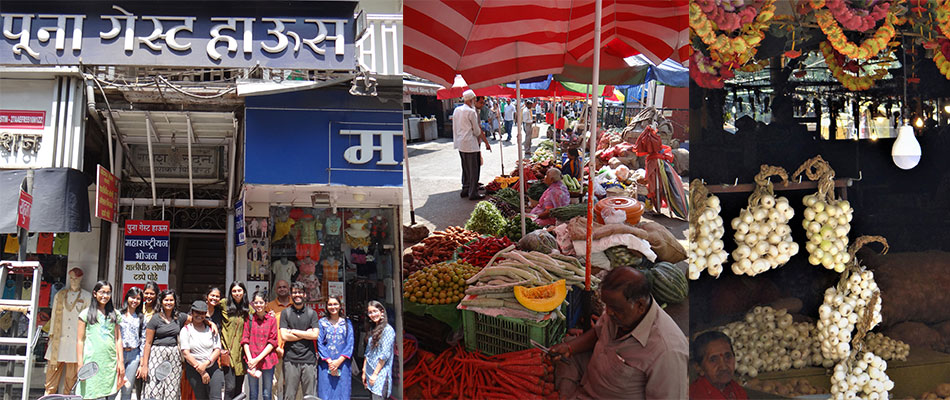Sixteen of the Sociology (Major/Minor) UG2 batch students participated in a guided 'Food Heritage Walk' in the old parts of the Pune city on March 17, 2019, Sunday. The walk was organized under the course 'Contemporary Sociological Discourses'. The idea of the food walk stemmed from the class discussions on ‘McDonaldisation of Society’ a concept developed by famous sociologist George Ritzer. The concept talks about the increasing uniformity, sameness, predictability and calculability in a society features similar to the functioning of a fast-food restaurant. The objective of the food walk was to explore the richness, diversity and uniqueness of the local food culture by visiting some of the old food joints and market places in the Pune city. The group was guided by well-known food blogger, reviewer and guide Mr. Jayesh Paranjape from INTACH, Pune chapter.

The group of students started from the FLAME campus at 8 on a Sunday morning. The assembly point in the city was Mahatma Phule Mandai a famous vegetable and fruit market built in 1884 by the Britishers. Here we met our guide who began with discussing the history, structure, use and stories behind coming up of the mandai which was initially called Lord Ray market. The marker was later renamed on the name of famous social reformer Mahatma Jyotiba Phule. Earlier the market was segmented based on the type of items sold there. The interactions revolved around the types and wide variety of vegetables and fruits sold here. As we visited some of the stalls the freshness, colorfulness, aroma and the diversity of vegetables and fruits sold here were a real eye-opener. Some of the sold items here are not available elsewhere in the city especially in the big super market stores since they don’t reach out to these places for procurement and are limited to selling ‘predicted’ set of items. We were told that people of different socio-economic and regional backgrounds find specific ingredients needed for cooking specific dishes at very economical rates in this market. A large number of customers were seen carrying huge quantities of fruits and vegetables perhaps for the entire week’s requirement as well as for retail selling in some cases.

The group then headed towards the first eating joint on the list of places to be visited. The place named ShriKrishna Bhuvan in Budhwar Peth known for its special and authentic Puneri Misal Pav. After trying this unique preparation it was time to explore close-by historic and heritage sites of Vishrambaug Wada and temple of Peshwa era followed by having Pune special Amrutulya Chai (tea) at a small tea shop by a busy market junction. Now we were taken in to the bustling and buzzing streets of the famous old Tulshibaug market. While stopping and checking out various items at small roadside stalls and crossing several narrow streets we reached the iconic Poona Guest House on Laxmi road. The place boasts of serving several authentic local dishes. The dining was on the first floor of this old yet well painted and maintained building which gave pleasant and welcoming vibes with noticeable cleanliness. The place had a wide range of breads, curries, desserts including a gramin (countryside) thaali. Two dishes, Dadpe Pohe (thin flatten rice dish) and Thaalipeeth Loni (a multi-grain paratha with white butter) were served to us. Both snack dishes stood out in terms of their texture, richness and taste especially Thaalipeeth Loni since the uses various kinds of grains and other local ingredients.

The food trail ended with trying out flavored ice-creams and faluda at the early 20th century Cold- Drink House. The place is known for serving mango flavored ice-cream fondly known as Mango-Mastani. It became the most sought after ice-cream in the city and got picked up by various newly opened ice-cream and cold-drink places.
The experience of this walk was extremely enriching as students originating from various cities across India are usually unaware of the historicity and diversity of the city. It was fascinating to learn about the origin, various ingredients and historical context of various local dishes and how certain old food joints are still attracting large number of people on day to day basis. The walk was not just about eating but as walk-participants we got insights into the political economy of a cultural landscape and its changing dynamics with the ever increasing homogenization of cultures and consumption patterns in contemporary times.
Nihaarika Lunia
UG2
Sociology Major
Prof. Shamsher Singh - Faculty, Sociology.


